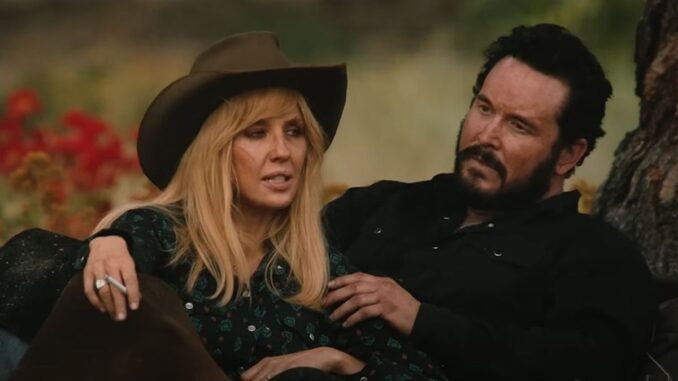
The Unburnt Scars and the Hopeful Horizon: Will Beth and Rip Find Peace on the Yellowstone?
Beth Dutton and Rip Wheeler. Their names, when spoken together, carry the weight of Montana’s vast sky, the sting of its brutal winters, and the enduring strength of its ancient mountains. Their love story, woven into the violent tapestry of the Yellowstone Ranch, is not a fairytale romance. It is a gritty, passionate, and often heartbreaking testament to the enduring power of connection in the face of unspeakable trauma and unrelenting adversity. But the question lingers: In a world where happiness feels like a fleeting dream, will Beth and Rip ever truly find their happy ending?
To understand their present, one must delve into their past. Both carry deep, festering wounds inflicted long before they ever met. Beth, scarred both physically and emotionally by a devastating act of cruelty in her youth, has built a fortress of acid wit and ruthless ambition to protect a vulnerability she refuses to acknowledge. She weaponizes her intelligence, using it to eviscerate her enemies and keep potential lovers at arm’s length. Rip, orphaned young and hardened by a life of violence and neglect, found solace and purpose under the wing of John Dutton. Loyalty is his religion, and the Yellowstone is his church. He is a man of few words, but his actions speak volumes, especially where Beth is concerned.
Their connection is forged in fire, a shared understanding of the darkness that lurks in the shadows. Rip sees beyond Beth's barbed wire exterior, recognizing the wounded child beneath. He accepts her, flaws and all, offering unwavering support and a quiet strength that anchors her chaotic spirit. Beth, in turn, challenges Rip’s stoicism, forcing him to confront his own pain and acknowledge the possibility of a life beyond the ranch. Their love is a constant negotiation between vulnerability and strength, a dance of acceptance and defiance.
However, their journey is perpetually threatened by the relentless forces that plague the Yellowstone. The Ranch itself is a magnet for avarice, attracting the attention of land developers, political adversaries, and even members of their own family, each vying for control. This constant battle for survival spills over into their personal lives, forcing them to make difficult choices and endure unimaginable losses. Beth, ever the protector of the Dutton legacy, often finds herself embroiled in morally questionable schemes, pushing Rip’s loyalty to its limits. Their love is tested not by petty disagreements, but by life-or-death scenarios, by the constant threat of violence and the ever-present weight of their past traumas.
The possibility of a happy ending hinges on several factors. Firstly, the survival of the Yellowstone is paramount. Without the Ranch, Rip loses his purpose, his home, his very identity. And without the Ranch, Beth’s protective instinct is rendered moot, leaving her adrift and vulnerable. Secondly, they must find a way to break free from the cycle of violence and revenge that has consumed their lives. Beth’s relentless pursuit of retribution, while understandable, threatens to consume her entirely, poisoning her happiness and potentially jeopardizing her relationship with Rip. She needs to learn to forgive, not just others, but also herself.
Finally, and perhaps most importantly, they need to allow themselves to be happy. Beth, in particular, struggles with this concept, convinced that happiness is a luxury she doesn't deserve. She needs to relinquish her self-destructive tendencies and embrace the possibility of a life free from the shadow of her past. Rip, on the other hand, needs to let go of his unwavering loyalty to John Dutton, allowing himself to prioritize his own needs and desires, including his life with Beth.
The final season of Yellowstone promises a reckoning, a culmination of all the forces that have shaped their lives. While the road ahead is undoubtedly fraught with peril, there is a glimmer of hope. Perhaps, amidst the carnage and the chaos, Beth and Rip can carve out a space for themselves, a sanctuary where they can finally find peace and build a future together.
Whether they ultimately achieve a "happy ending" in the traditional sense remains to be seen. But perhaps, for Beth and Rip, happiness isn't about escaping the darkness, but about finding the light within it, about forging a love that is strong enough to withstand the storms, and about building a life together on the land they both so fiercely protect. Their story is a reminder that even in the harshest landscapes, amidst the unburnt scars and the lingering pain, love can blossom, offering a beacon of hope on the horizon. And that, in itself, might just be enough.
